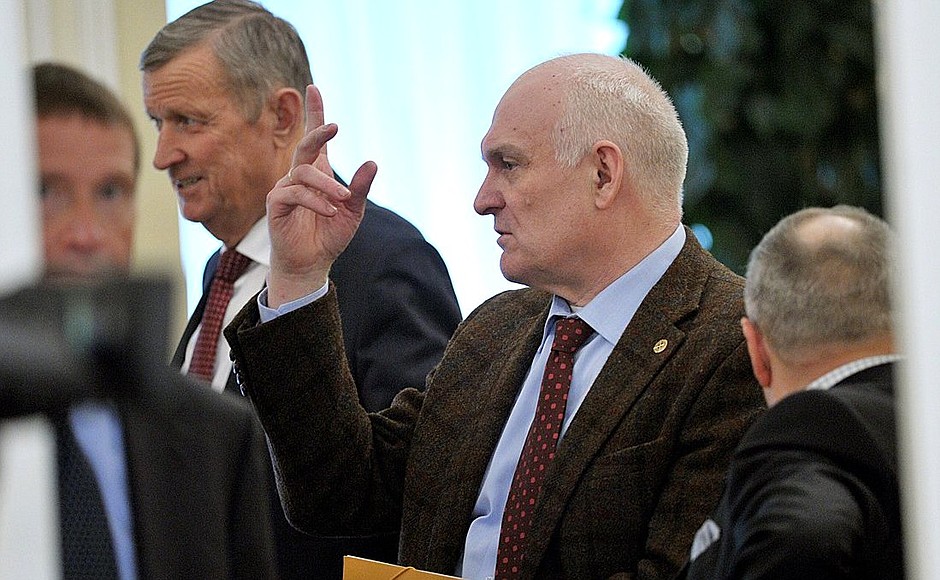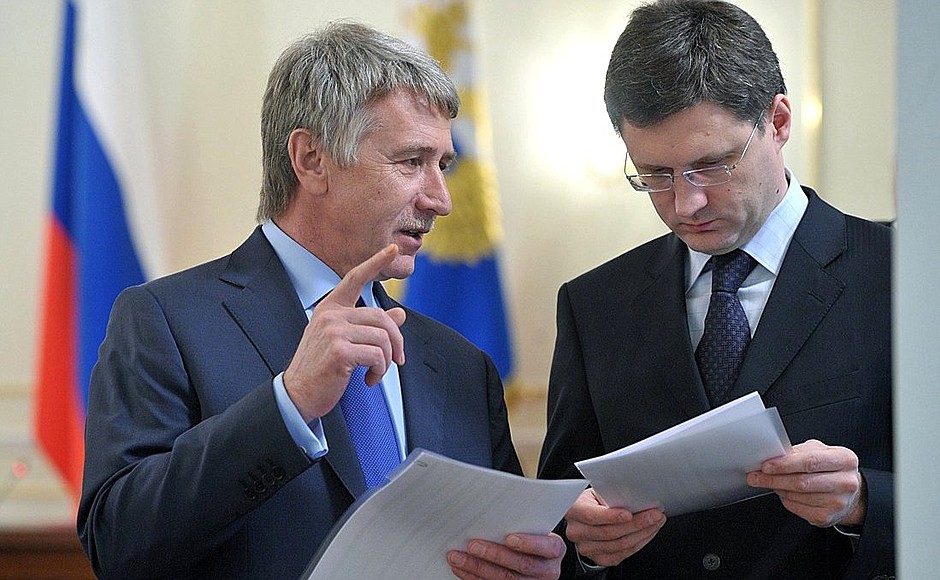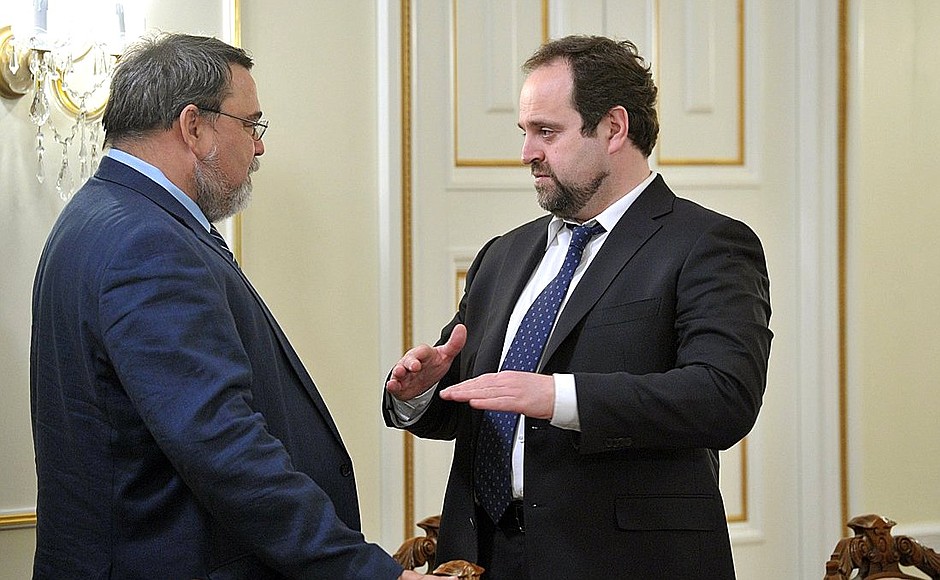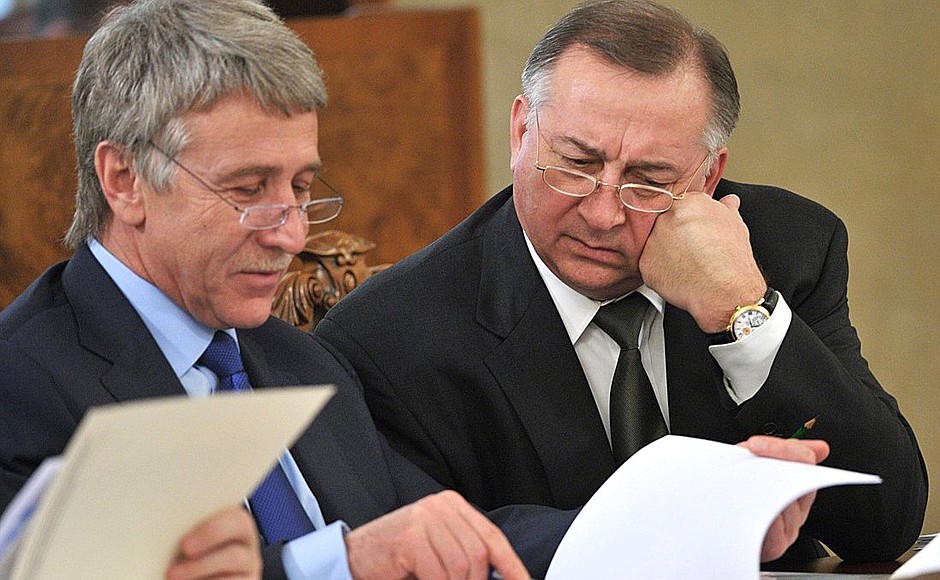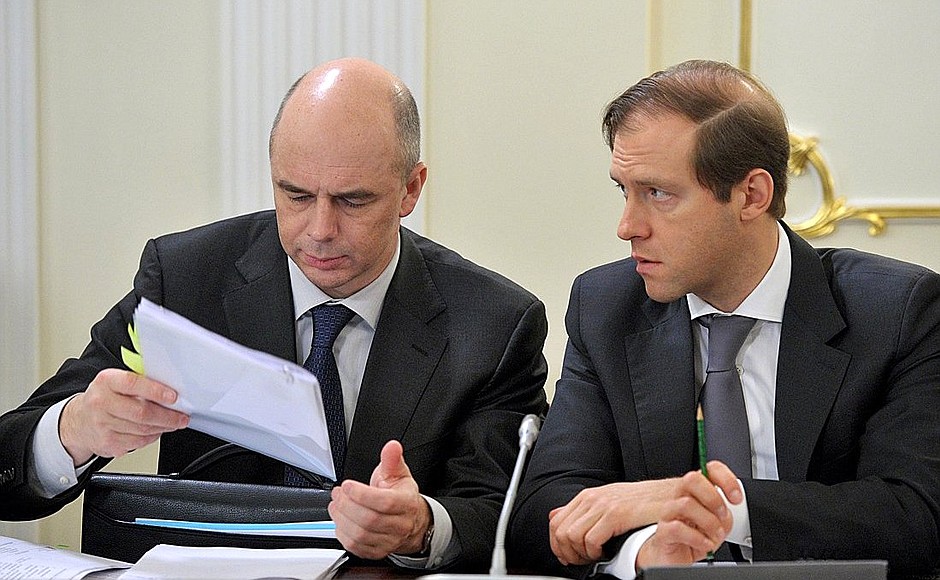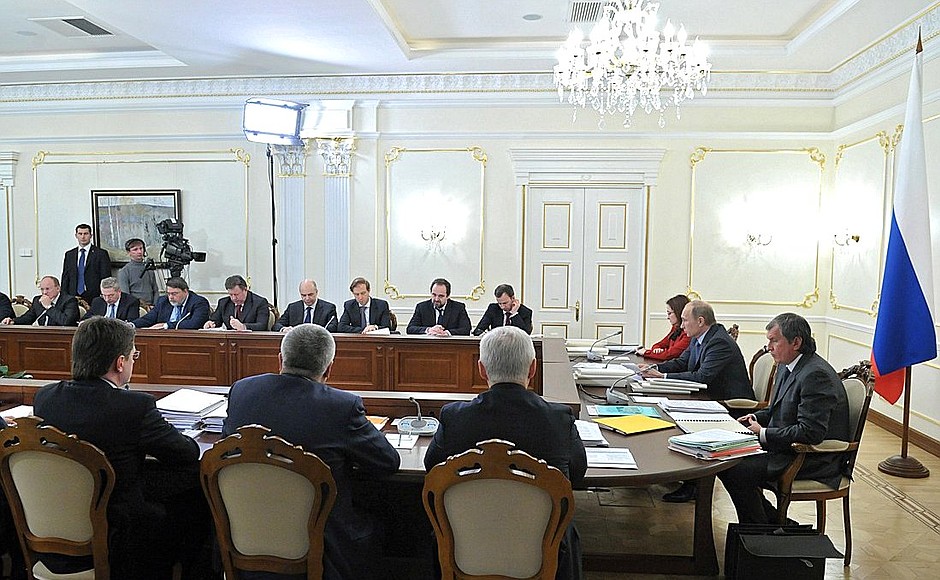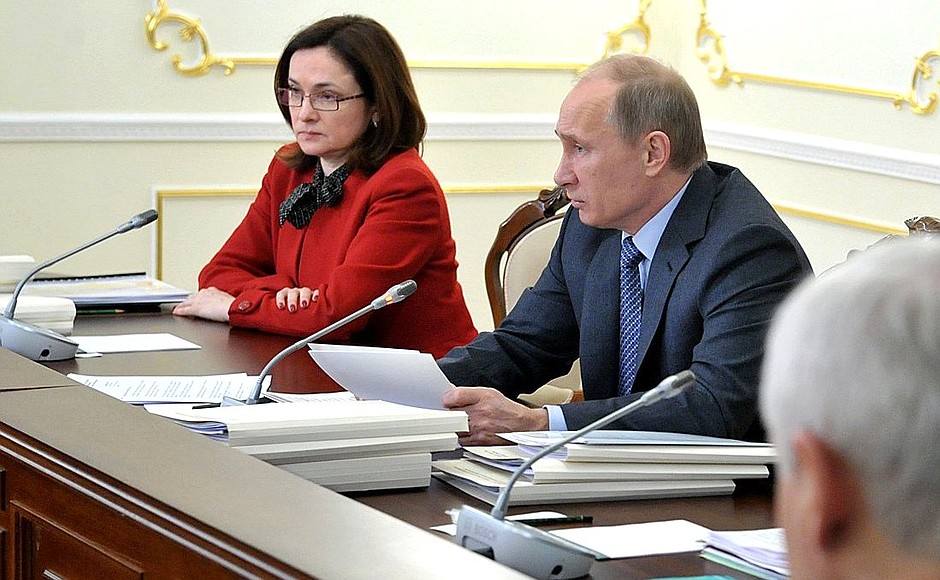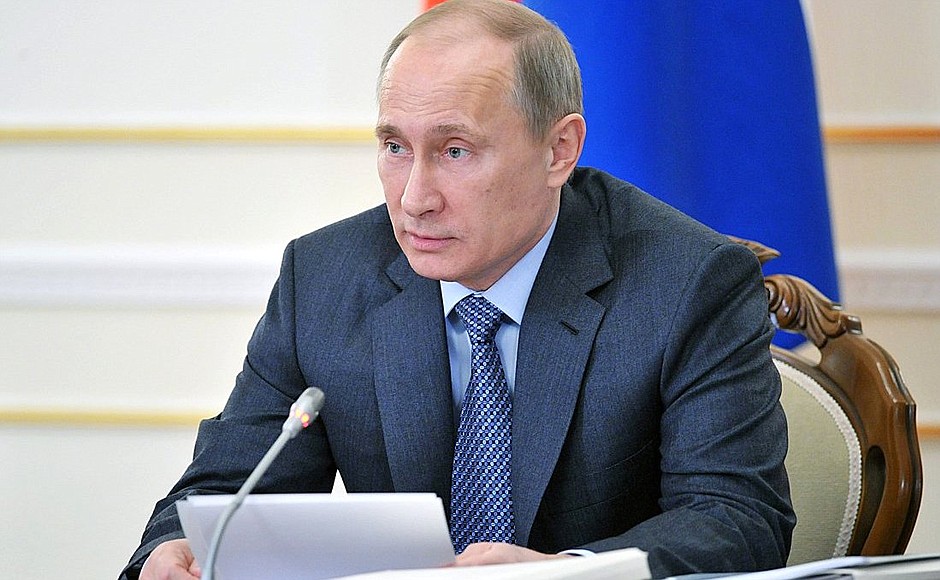See also
The meeting was examining the resource base’s current state and development issues, including developing Russia’s continental shelf, drafting a state industrial security policy concept, and energy exports.
The meeting also examined measures for guaranteeing transparency at energy sector companies with state stakes.
* * *
Speech at a meeting of the Commission for Strategic Development of the Fuel and Energy Sector and Environmental Security
President of Russia Vladimir Putin: Colleagues,
We have a very busy agenda for today’s meeting of the Commission for Strategic Development of the Fuel and Energy Sector and Environmental Security.
Before we start our work though, you have all heard about the passing of Rem Vyakhirev, former CEO of Gazprom and a person who did a great deal to develop Russia’s energy sector, the gas sector in particular of course, but also the energy sector in general. I ask you to honour his memory now.
(Minute of silence)
We will start today by looking at the resource base’s development and effective use. Investors show great interest in our fields, and there is also a lot of interest in financial investment in this sector.
Our archaic estimation methods meant that Russia’s resource base has been undervalued. This has a direct impact on how attractive our energy sector companies are for investors. The market actors – the energy companies and the investors – have to have accurate information about reserves, and our natural assets must have a proven, clear and objective value.
”Our archaic estimation methods meant that Russia’s resource base has been undervalued. This has a direct impact on how attractive our energy sector companies are for investors. Our natural assets must have a proven, clear and objective value.“
We are to develop and approve new methods for classifying reserves that follow international standards as closely as possible. We discussed this matter just before with our Government colleagues, company representatives, and the Commission’s secretary. The specialists think that our estimation system has a lot of positive aspects, and our task will therefore be to bring it as close as possible to the methods our colleagues abroad use and make it more comprehensible for them.
I think it is also time to look at declassifying data on reserves. These kinds of confidentiality rules are obviously outdated now, when we have foreign investors working in the Russian energy sector and our companies’ reserves go through international audits. We have nothing to keep secret here, after all, nothing to hide, and so these rules are only harmful.
Further, all subsoil resource users must comply with the field development rules and fully extract reserves across the whole territory and not simply ‘skim off the cream’. Above all of course, this means using the right technology.
Let me give an example. If you take a field and just start with uncontrolled extraction of all the gas, the oil will go to waste. As for extracting oil using hydraulic fracturing and other rather barbaric techniques, you know what this leads to. The specialists are well aware of the consequences.
We should introduce obligatory rules for developing and exploring fields, and of course fields should go through a very thorough comprehensive evaluation right at the first stage of project development. All factors influencing production effectiveness should be taken into account.
In this regard, I ask you to look at the matter of granting Rosnedra [Russian subsoil resources agency] the powers to carry out state evaluation studies. The central commission for approving project feasibility studies should become a collegial body that will include representatives from the ministries and agencies, the companies, and also environmentalists, scientists, and experts.
”It is time to look at declassifying data on reserves. These kinds of confidentiality rules are obviously outdated now, when we have foreign investors working in the Russian energy sector and our companies’ reserves go through international audits.“
I stress the point that our final objective is to ensure that our fields operate as effectively as possible and coordinate their development with regional, local, sector, and infrastructure development plans and strategies. At the same time, we must decide how to replenish our resource base and step up geological prospecting work in yet little studied but promising regions.
Of course, reality also confronts with the question of how to encourage development of fields with reserves that are difficult to extract. When doing so we will take objective criteria alone as our guideline. The specialists are very familiar with these criteria. The tax breaks that were approved last spring apply to this category of fields. Let’s discuss today how well these mechanisms are working in practice.
It is important to remember that extraction from these kinds of difficult fields creates greater demand for scientific studies, advanced technology and innovative equipment, as well as creating new jobs in the metals sector, chemicals industry, and machine building. The projects underway in Tatarstan, Western Siberia and Sakhalin demonstrate just this kind of multiplying effect.
The next matter on the agenda is that of increasing and diversifying Russian gas supplies to the world markets. This is a big issue for Russia. Last year, as you know, shrinking markets and lower gas exports cost the Russian budget billions of dollars.
But the forecasts all predict that global demand for gas will grow over the coming 20 years, above all in Asia, but I think demand will grow in Europe too, especially now that some of Europe’s main industrially developed countries are renouncing nuclear energy. The liquefied natural gas market is set to become more and more important.
Russia’s share of the global liquefied natural gas export market is only 3.6 percent at the moment. If we do not follow an active policy we will risk losing this market almost entirely to our competitors. We are to remember too, that building modern LNG facilities takes up to 5–7 years, sometimes even up to 10 years. You all know that these are very capital-intensive projects too, of course.
”Our final objective is to ensure that our fields operate as effectively as possible and coordinate their development with regional, local, sector, and infrastructure development plans and strategies. At the same time, we must decide how to replenish our resource base and step up geological prospecting work in yet little studied but promising regions.“
We have to put all the right conditions in place for developing this sector. This includes reflecting on possible gradual liberalisation of LNG exports and organising production of the required technical equipment here in Russia. Let’s discuss these matters too, today. We will continue with this subject in the future too and address it in concrete and consistent fashion.
Colleagues, the next matter on the agenda is the new state policy concept for regulating industrial security. The Government already received the instructions to begin this work. The rules currently in place are obsolete rules from last century. I want to draw your attention to the following points.
First, we have to put in place a reliable and transparent mechanism for ensuring safe operation of hazardous production facilities.
Second, the legislative base in industrial security must not be in contradiction with the laws regulating the energy sector’s operations.
Third, we should set clear criteria and distinctions of hazardous production facilities and put them into categories.
Finally, we need to set strict liability for company executives and also for designers and experts.
We should considerably raise expert organisations’ level of corporate legal liability. We must particularly thoroughly examine the issue of their licensing and put in place a transparent system of requirements and supervision for their operation.
But we must not create excessive red tape. We have been working constantly to get rid of administrative barriers. We must not create new and unnecessary ones now, but at the same time, we cannot ignore areas that the state must be able to monitor.
I want to hear from you today on how the new government industrial security policy will resolve these issues, and also on the draft law on industrial security, its provisions, and the deadlines for their implementation.
Colleagues, let me say a few words about the electricity sector. We have discussed the problem of payments discipline in the sector a number of times, but we haven’t made an inch of progress since then it seems. Of course, things are changing, but very, very slowly, and we have yet to see the hoped-for results.
What’s more, last year’s results show that total electricity debts rose by more than 60 percent. There are quite simply flagrant examples. The Energostream company is one notorious case. I think seven criminal cases have already been opened against it. The managers have all fled somewhere and no one can seem to be able to catch them.
Other companies also have many problems. OGR-2, for example, used higher physical amounts of work and costs than was really the case to calculate its tariffs. Problems continue at MRSK North Caucasus, and there are similar violations during construction of generation facilities. More than 12 billion rubles [$400million], including money received as part of extra emissions credits, went into building the Zagorskaya-2 Power Station. We have to look in general at how these companies are spending the money and what the management is doing.
”It is important to remember that extraction from these kinds of difficult fields creates greater demand for scientific studies, advanced technology and innovative equipment, as well as creating new jobs in the metals sector, chemicals industry, and machine building. The projects underway in Tatarstan, Western Siberia and Sakhalin demonstrate just this kind of multiplying effect.“
A contract for more than 6 billion rubles [$200 million] was signed with Gidrostroy, the general contractor, and 12 billion rubles were spent on purposes that clearly did not match the declared needs. I will send these documents on to the law enforcement agencies later and they can take a closer look. There are also problems with so-called ‘unswitchoffable’ customers, who abuse their special position and simply don’t pay for their electricity.
In order to settle this debt problem, I remind you that the Commission approved last July a new electricity payments system that introduced strict control over bringing down costs, including partial restrictions on their use with the help of special bank accounts. The Government was instructed to draft the relevant laws.
The new payments system was to begin operation in the Central and Urals Federal Districts, but little progress has been made so far. I want to hear from you today what are the problems here, and why are we encountering these kinds of delays in decision making?
We clearly must break the vicious circle that has formed over the past years. Given that the introduction of new electricity payment methods concerns directly the regions’ activities, I propose that we discuss this issue at a State Council meeting. The Market Council [for organising effective wholesale and retail trade of electricity and generating capacity] proposes taking even tougher measures to get the payments system in order and tighten discipline. Let’s discuss their proposals too, today.
We also are to significantly improve control over enforcement of court decisions. There are cases when companies and all kinds of intermediaries pile up billions in debt, do not settle their bills and ignore court decisions. What are the bailiffs doing? I ask the bodies concerned to analyse this work and report.
I also want to say a few words about the situation with state companies in the energy sector. More than a year ago, I gave instructions aimed at making these companies’ activities more transparent, but not all of these provisions have been implemented properly and in full.
For example, the relevant legislative framework has not been put in place yet, and there is still no mechanism for removing state companies’ top managers from their posts, including for refusal to declare information about participation in other organisations’ business activities.
Information on final beneficiaries is either incomplete or not provided at all. All-round cooperation between the law enforcement agencies and the other state bodies has also not been properly organised yet.
In conclusion, I want to say once more that not all of the Commission’s decisions have been implemented. In this regard, I ask the Commission staff to work constantly on making sure that decisions are actually implemented, and report immediately on all cases of red tape and bureaucratic delays.
